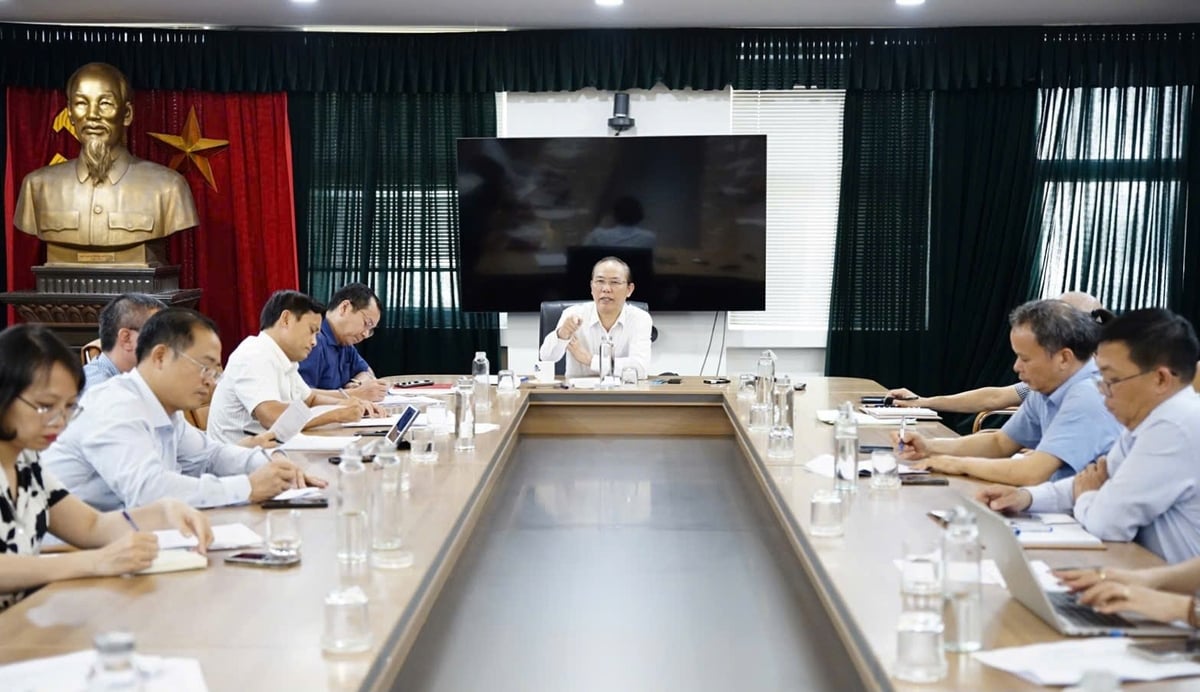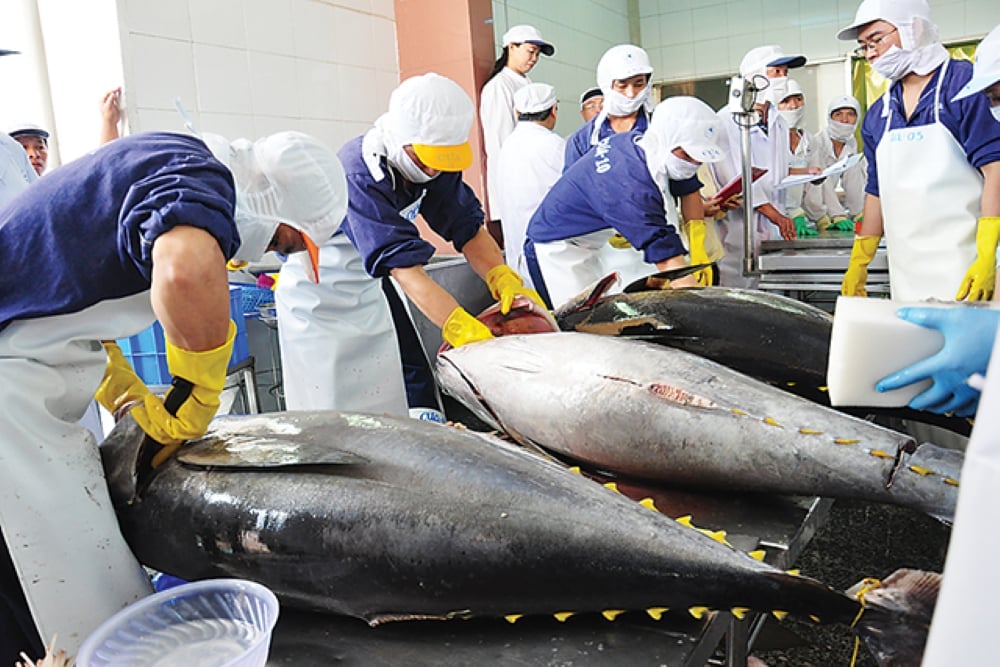December 8, 2025 | 06:11 GMT +7
December 8, 2025 | 06:11 GMT +7
Hotline: 0913.378.918
December 8, 2025 | 06:11 GMT +7
Hotline: 0913.378.918
On September 3, Deputy Minister of Agriculture and Environment Phung Duc Tien chaired a meeting with relevant agencies to address the assessment of Vietnam's marine mammal conservation efforts under the U.S. MMPA.
The U.S. had previously announced a list of 135 countries assessed for equivalence, categorizing them into three groups: fully recognized, partially recognized, and not recognized. Vietnam was one of 34 nations to receive only partial recognition, with 12 groups of captured seafood products from 12 fisheries and gear types as comparable and are thus prohibited from import into the U.S. starting January 1, 2026.
According to a report from the Directorate of Fisheries and Fisheries Surveillance, the U.S. National Oceanic and Atmospheric Administration (NOAA) sent a letter on August 26 notifying Vietnam of its assessment results. The findings indicated that while some fisheries were deemed equivalent, 12 others were rejected. This means that from January 1, 2026, fish and products from these fisheries will no longer be eligible for import into the U.S.

Deputy Minister Phung Duc Tien chairs a meeting with relevant agencies to discuss the equivalence assessment for marine mammal conservation under the U.S. Marine Mammal Protection Act (MMPA). Photo: Linh Linh.
The list of affected products includes various types of tuna, mackerel, squid, octopus, and some crustaceans, all key export items for Vietnam.
According to 2024 statistics, Vietnam's total seafood exports to the U.S. reached USD 1.805 billion. Of this, tuna products accounted for nearly USD 385 million; marine fish nearly USD 765 million; and squid, octopus, crab, and other mollusks an estimated USD 127 million. Products originating from domestic fisheries were estimated at nearly USD 400 million, with roughly half of that amount - USD 200 million from the 12 non-compliant fisheries now facing a U.S. import ban.
The impact extends beyond export value, directly affecting the livelihoods of fishermen, the operations of processing and export companies, and the reputation of Vietnamese seafood on the international market.
To Viet Chau, Deputy Director of the International Cooperation Department, stated that the U.S. decision was primarily based on three factors: a high risk of fishing gear interacting with marine mammals, a lack of monitoring mechanisms and reporting for unintentional bycatch, and ineffective mitigation measures. In response, he proposed that the Ministry assign the Directorate of Fisheries and Fisheries Surveillance to lead the progress of a comprehensive response plan and prepare technical documentation for discussions with U.S. authorities.

Total seafood exports to the U.S. market reached USD 1.805 billion, with tuna products accounting for nearly USD 385 million. Photo: VnEconomy.
Chau emphasized that this is a highly specialized technical issue that requires a deep analysis of each fishery, gear type, and management method to demonstrate Vietnam’s improvement efforts. He also warned of the urgent need to inform export businesses so they can adjust their business plans, as many shipments may not be able to enter the U.S. market after January 1, 2026, without changes.
He also suggested that the Ministry of Foreign Affairs, the Ministry of Industry and Trade, and other relevant agencies should strengthen diplomatic channels and consult with the U.S. to clarify the basis of the assessment. Additionally, he recommended studying the experiences of nations that have been fully recognized to improve Vietnam’s dossier for the next phase.
From a market perspective, Le Ba Anh, Deputy Director of the Department of Quality, Processing and Market Development, noted that Vietnam is not the only country to be partially rejected. Many nations, including China, South Korea, the Philippines, Myanmar, and Indonesia, are in a similar situation. However, Thailand, India, and Cambodia have been fully recognized, indicating that Vietnam can learn from their experiences.
According to Le Ba Anh, the most crucial tasks now are to review and amend legal regulations and establish an effective fisheries monitoring program. He described these as the most difficult and time-consuming tasks, yet they are essential for achieving recognition in the next phase. He stressed that Vietnam has only three months to prepare and submit a complete supplemental dossier before the U.S. measures take effect in 2026.
Concluding the meeting, Deputy Minister Phung Duc Tien stated, “This is not just a technical challenge but a strategic issue concerning trade and national reputation. If we do not prepare seriously, Vietnamese seafood will lose a major market and a long-term development opportunity.”

Deputy Minister Phung Duc Tien urges agencies to take decisive action. Photo: Linh Linh.
The Deputy Minister directed all units to review their assigned tasks, clearly defining responsibilities, timelines, budgets, and expected outcomes, with a final report due before January 1, 2026. He called for an immediate and concrete implementation of all tasks, including policy amendments, budget allocation, and increased monitoring and supervision.
He also stressed the need for a thorough analysis of export data, particularly for tuna - a key seafood export to the U.S. to develop appropriate solutions. He also mentioned the need to plan for a potential 20% tariff from the U.S.
Additionally, the Deputy Minister announced he would request close coordination with the Ministry of Foreign Affairs and other relevant ministries and sectors to learn from other countries' experiences and mobilize the participation of associations, businesses, and local authorities.
“We cannot wait until the ban takes effect to start scrambling,” the Deputy Minister emphasized. “From now until the end of the year, all units must act decisively and be fully prepared on legal, technical, and diplomatic fronts”.
Translated by Linh Linh

(VAN) At the TARASA25 Conference, participating countries shared experiences on implementing agroecology and regenerative agriculture, contributing to a sustainable transformation of food and agriculture systems.

(VAN) Green industry is becoming a driving force for the development of Hue City, not only promoting economic growth but also protecting the environment, creating the foundation for the Net Zero goal.

(VAN) As of 2025, the ASEAN region has a total of 69 ASEAN Heritage Parks recognized across its 10 member states. Among them, Viet Nam contributes 15 ASEAN Heritage Parks.

(VAN) Yok Don National Park has high biodiversity with numerous endemic plant and animal species, and it is also the only dipterocarp forest ecosystem conservation area in Viet Nam.

(VAN) Viet Nam and Brunei signed two important MOUs on fisheries and IUU, expanding cooperation in agriculture, the environment, and Halal exports, aiming to substantively implement joint projects.

(VAN) The Viet Nam Coconut Association worked with the International Finance Corporation (IFC) and businesses to promote the supply chain, enhance competitiveness, and develop the coconut industry sustainably.
![Hue aims for Net Zero: [2] Pioneering low-emission tourism](https://t.ex-cdn.com/nongnghiepmoitruong.vn/608w/files/huytd/2025/12/04/0633-dulichzero-4-095634_236-161125.jpg)
(VAN) The ancient capital of Hue has developed Net Zero tourism products and models, aiming to reduce carbon emissions and pioneer the establishment of Viet Nam's green tourism destination.